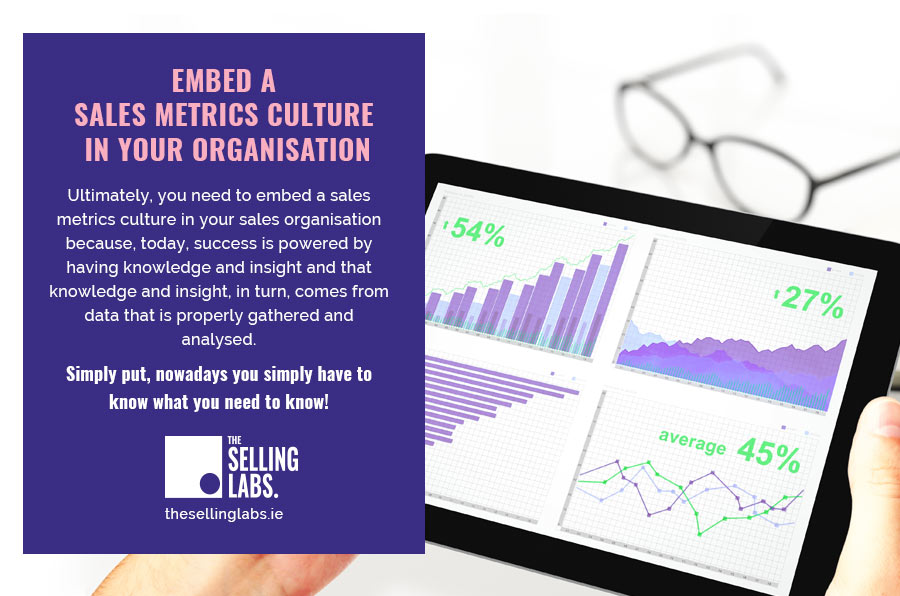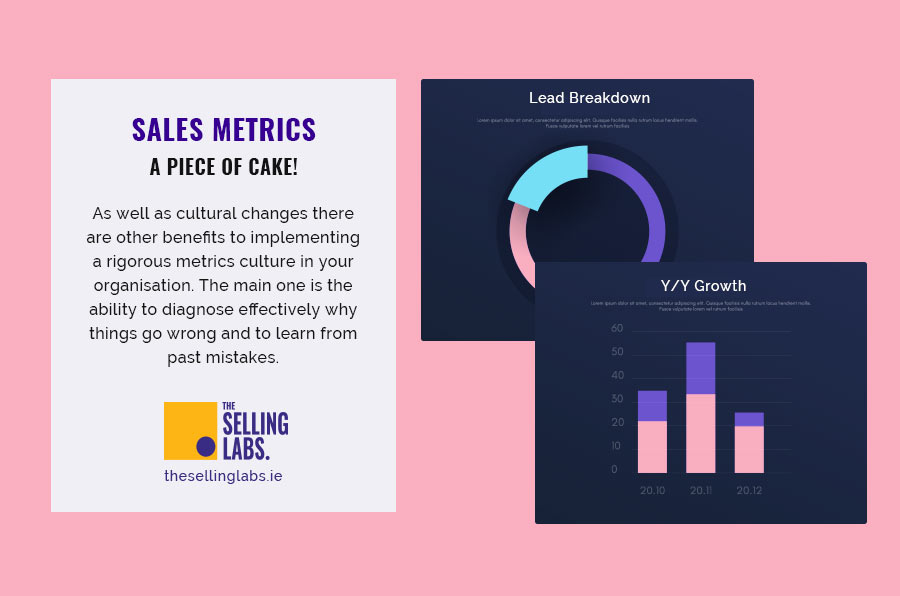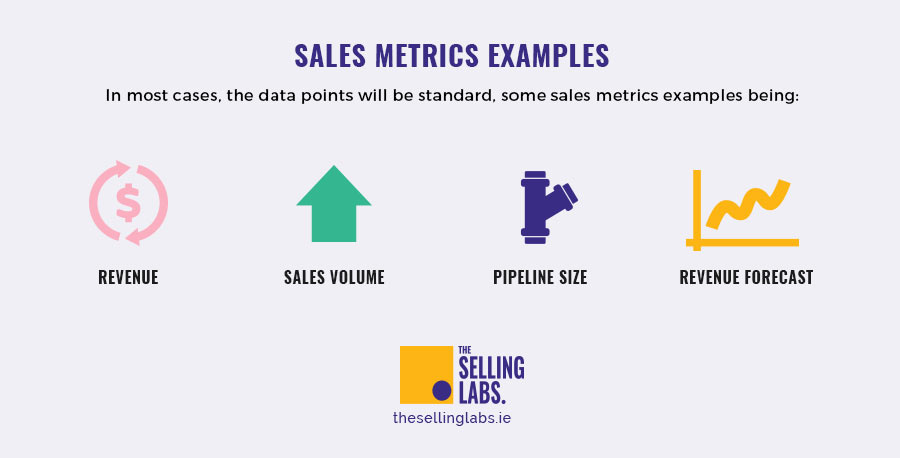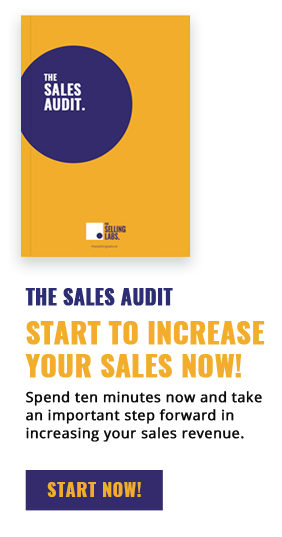Believe it or not, many professionals say that when it comes to sales success, sales metrics are more powerful than personality. Hard to accept, huh?
Use of Metrics in Sales
Of course, personality accounts for quite a lot in sales and the jury is still out as to whether robots will ever be able to sell as well as humans. But, without question, the use of metrics in a sales pitch is extremely powerful because strengthening your proposition with data-backed evidence will set you apart from your competitors.
You’ve probably got to where you are in your career because of your engaging vision, your compelling communication style and your energy and confidence rather than on your ability to code or analyse. So rather than try to become an expert in an area that is not your speciality, why not recruit the help of the people who are experts. The financial team or your business analysts could certainly help you for instance. In today’s data-driven business world, their input will raise your sales game while allowing you to stick to what you’re good at.
Embed A Metrics Culture In Your Organisation
Ultimately, you need to embed a sales metrics culture in your sales organisation because, today, success is powered by having knowledge and insight and that knowledge and insight, in turn, comes from data that is properly gathered and analysed. Simply put, nowadays you simply have to know what you need to know! Good metrics and a good metrics strategy provide this knowledge and, as a result, help to create an internal ‘culture of success’ that reflects positively on the bottom line.

How To Develop Sales Performance Metrics
So how do you go about developing an effective sales performance metrics strategy? Here are some suggestions:
- Pick the right sales performance metrics and not too many of them. Kicking off with one big magic number is a great way to corral the team.
- Get into the discipline as early as possible in the company’s lifetime.
- Insist on live-time reporting or the daily publication of key metrics – “Data at rest tends to stay at rest”
- Know what’s sensitive and what’s not and ensure everyone has access to as much information as they can.
- Make all decisions using data and let your team know you do so – “highly data-driven organizations are 3X more likely to report significant improvement in decision-making”. (PWC)
With these tips in place, you should find your organisation becomes more focussed on its objectives and that can only be positive for the sales team and for the senior leadership team.

Metrics – A Piece of Cake!
As well as cultural changes there are other benefits to implementing a rigorous metrics culture in your organisation. The main one is the ability to diagnose effectively why things go wrong and to learn from past mistakes.
An Analogy: Let’s imagine you’re making a cake. You select a recipe and the ingredients required. You carefully weigh and mix them together as per the instructions and you bake the cake at the suggested temperature. But when it comes out of the oven it doesn’t look like the one on the page!
Still, as you followed the steps (and as you have no alternative!) you serve it to your family and ask them what they think – for good and for bad. Thankfully, they kind of liked it (they asked for it in the first place!), though there were acute differences of opinion about sweetness, sponginess and crustiness. Determined to get it right next time you take on board their feedback, you read back over the recipe again with it in mind, you check the oven settings and the ingredient ratios and their implications for texture, you resolve to pay closer attention. You get to work. Your next cake – a triumph!
Applying The Analogy: The quarterly results for a new market are published and they’re worse than your first cake (someone lost a filling!). You urgently review all components of the operation, you have heated conversations with the teams: what was to blame for the poor sales?; what was wrong with the ‘ingredients’?; did we get the ‘measurements’ wrong?; did we misinterpret the sweetness, sponginess and crustiness of the market? was the temperature too high?; was our advertising campaign overdone in its timing or pitch style?; does our SaaS sales process need to be refined?; was the recipe right or wrong to begin with?
You know that only a rigorous and thorough deep-dive on each component of the issue will provide the insights you need to prevent the issue from occurring again. So, you gather all the information you need and you study it intensely and for the first time you clearly see where you might’ve gone wrong. The power of metrics!
On Expert Sales Tips
Get regular updates delivered straight to your inbox with expert sales tips for tech & SaaS companies. Enter your email below and start to increase your sales now.
A Practical Approach to Metrics
Of course when it comes to metrics, deciding what trends, behaviours and dynamics to track are key to understanding the performance of your business. Google, one of the most data-driven companies around, recommends starting with the end destination in mind – whether it’s resolving a problem or predicting a future business – and working backwards, selecting the data you need only when you have a good idea of where you want to end up.
Then you instruct your analysts to locate the data.
Sales Metrics Examples
In most cases, the data points will be standard, some sales metrics examples being – revenue, sales volume, pipeline size, revenue forecast. Sometimes, the metrics will vary according to the business model, as Anu Hariharan at YCombinator points out. Large Enterprise businesses will measure contracts closed and committed revenue while SaaS companies’ lifeblood will be monthly rolling revenue.

Back Up Your Pitch With Data
But in general terms, the beauty of data is its logic and truth. Anything else is subjective and open to interpretation. When you work in sales it is especially important to back up your pitch with data as you are already in a defensive position, trying to persuade someone that you have a solution and outselling your competitors. Using facts and logic to influence rationally and objectively will ensure you are remembered. Data helps you solidify your argument and make your argument more convincing, whoever you’re selling to. And that’s a verifiable fact!
Here at The Selling Labs we provide sales consulting to help sales teams hit and exceed their sales targets. To see how we can help you or your organisation get in touch with us now.
On Expert Sales Tips
Get regular updates delivered straight to your inbox with expert sales tips for tech & SaaS companies. Enter your email below and start to increase your sales now.



